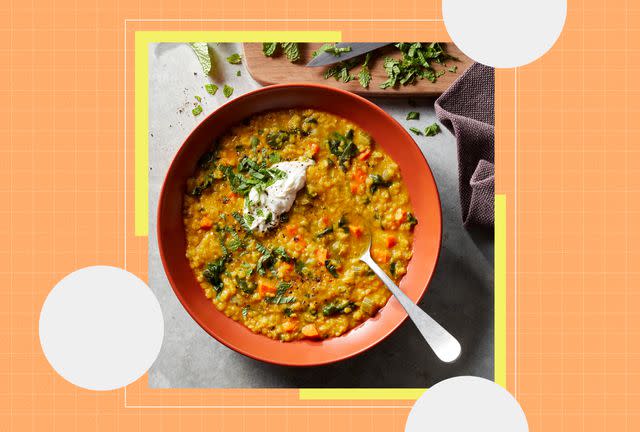The #1 Spice to Decrease Inflammation, According to a Dietitian
Hint: It plays a starring role in a very trendy latte.
Reviewed by Dietitian Emily Lachtrupp, M.S., RD
Spices have a way of earning superfood status. Cinnamon may help manage blood sugar. Ginger is good for bloating. And spicy foods have been linked to healthier blood pressure. So, it’s no surprise that when we talk about reducing inflammation, there are some spices that are said to do just that.
You might hear the term “inflammation” thrown around all the time—but what does it actually mean for your health? And for such a chronic condition, can one food—specifically, one spice—actually play a role in reducing inflammation? We’re here to break it down.
Related: The Best Foods to Eat to Fight Inflammation

Jacob Fox
What Is Inflammation?
Inflammation is essentially your body’s way of protecting itself from harmful things like infections or injuries. “The immune system initiates an inflammatory response by gathering immune cells to the impacted area to heal it or fight off an infection,” says Shannon Costello, a plant-based registered dietitian nutritionist and owner of Chef Shannon Nutrition.
Inflammation is an important short-term response, as it’s your body's natural way of healing itself. However, chronic, or long-term, inflammation is what can cause harm, possibly leading to cardiovascular disease, metabolic disorders, cancer, joint conditions and more, Costello adds.
That’s why understanding and managing inflammation is crucial for staying healthy. There are a number of ways you can do this, including consuming anti-inflammatory foods, like spices.
The #1 Spice to Decrease Inflammation
If you’re focusing on a single spice to decrease inflammation, choose turmeric.
Turmeric, a root related to the ginger family, is a bright yellow spice. It contains a compound called curcumin that’s responsible for its anti-inflammatory and antioxidant properties. Although the actual mechanisms can be quite complex, Costello explains, there is promising research that suggests curcumin directly acts as a shield to healthy cells during an inflammatory response.
In fact, a 2021 review published in Drug Design, Development and Therapy concluded that there was a strong correlation between curcumin and decreased inflammation. The research explains that curcumin targets several inflammatory pathways and may be useful as part of a treatment approach for inflammatory conditions, such as arthritis and psoriasis.
The review also highlights how curcumin may play a role in improving levels of C‐reactive protein (CRP), which Costello explains is a blood protein that increases in response to inflammation. This is important to keep in mind, as high levels of CRP in the blood can be a marker of chronic inflammation.
One limitation is that the amount of curcumin needed to meaningfully impact an inflammatory disease is likely too high to get from food, like turmeric, alone. The most potent type of treatment may come from a supplement, this research points out.
Still, adding turmeric to your meals is one doable move you can make to potentially decrease the inflammatory load on your body. If you have a disease where inflammation plays a part in the development or severity of symptoms, then you may find that adding turmeric to your meals as part of an overall anti-inflammatory diet makes a difference for you. It’s important, though, to stick with any current treatment plan; turmeric is not a replacement for medication.
Turmeric Recipes to Try
Revamp your daily meals with these anti-inflammatory turmeric-infused ideas:
Kick-start your morning with a vibrant yellow Mango Smoothie Bowl filled with fresh fruit, coconut milk and a dash of turmeric.
Then, power your lunch and dinner with nourishing recipes like Red Lentil Soup with Saffron or Turmeric Rice Bowl with Garam Masala Root Vegetables & Chickpeas.
Wind down at nighttime with a lightly sweetened, caffeine-free Turmeric Latte or Joy Bauer’s Anti-Inflammatory Tea.
Turmeric is also ideal for coloring plant-based egg dishes such as tofu scrambles or silken tofu quiches to make them look more egg-like, says Costello.
When eating turmeric, it’s a good idea to add a tiny pinch of ground black pepper to the dish, suggests a 2022 study from Free Radical Biology and Medicine. Piperine, the major active component of black pepper, helps increase the curcumin’s bioavailability (the amount of the compound your body can absorb). Enjoy your spiced-up meals!
Read the original article on Eating Well.

